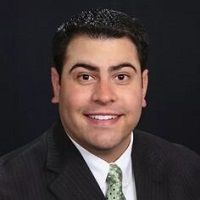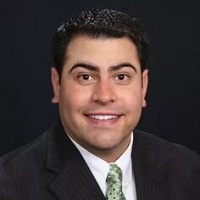Three Key Facts to Know About Your RMDs
If any of your retirement savings are in a tax-deferred account, then you will face required minimum distributions (RMDs). Not having a strategy could prove costly.


Profit and prosper with the best of Kiplinger's advice on investing, taxes, retirement, personal finance and much more. Delivered daily. Enter your email in the box and click Sign Me Up.
You are now subscribed
Your newsletter sign-up was successful
Want to add more newsletters?

Delivered daily
Kiplinger Today
Profit and prosper with the best of Kiplinger's advice on investing, taxes, retirement, personal finance and much more delivered daily. Smart money moves start here.

Sent five days a week
Kiplinger A Step Ahead
Get practical help to make better financial decisions in your everyday life, from spending to savings on top deals.

Delivered daily
Kiplinger Closing Bell
Get today's biggest financial and investing headlines delivered to your inbox every day the U.S. stock market is open.

Sent twice a week
Kiplinger Adviser Intel
Financial pros across the country share best practices and fresh tactics to preserve and grow your wealth.

Delivered weekly
Kiplinger Tax Tips
Trim your federal and state tax bills with practical tax-planning and tax-cutting strategies.

Sent twice a week
Kiplinger Retirement Tips
Your twice-a-week guide to planning and enjoying a financially secure and richly rewarding retirement

Sent bimonthly.
Kiplinger Adviser Angle
Insights for advisers, wealth managers and other financial professionals.

Sent twice a week
Kiplinger Investing Weekly
Your twice-a-week roundup of promising stocks, funds, companies and industries you should consider, ones you should avoid, and why.

Sent weekly for six weeks
Kiplinger Invest for Retirement
Your step-by-step six-part series on how to invest for retirement, from devising a successful strategy to exactly which investments to choose.
The federal government loves its acronyms — EPA, FBI, CIA, IRS. But for retirees, among the most important acronyms to understand is this: RMD.
RMD stands for required minimum distribution, three seemingly simple words that are fraught with financial implications. What is their significance? Simply this: Once you reach a certain age, the IRS will require that you begin withdrawals from your tax-deferred retirement accounts, such as traditional IRAs or 401(k)s. You will have to make those withdrawals annually even if you keep working, don’t need the money and even if the markets are down and you prefer to wait for a recovery to regain losses. Failure to take your RMD will result in a stiff excise tax penalty.
The reason for these forced withdrawals? Very simple. You haven’t paid ordinary income tax on these accounts — and Uncle Sam is tired of waiting around. For years, even decades in many cases, you’ve been allowed to defer the tax on these accounts, resulting in compounding interest. That was advantageous for you, but at the same time that you were constructing a nice nest egg for retirement, you were also building up an IOU to the IRS. After all, the tax bill on that money was deferred, not eliminated. Once you retire, any money you withdraw from these accounts is taxed at current ordinary income tax rates.
From just $107.88 $24.99 for Kiplinger Personal Finance
Become a smarter, better informed investor. Subscribe from just $107.88 $24.99, plus get up to 4 Special Issues

Sign up for Kiplinger’s Free Newsletters
Profit and prosper with the best of expert advice on investing, taxes, retirement, personal finance and more - straight to your e-mail.
Profit and prosper with the best of expert advice - straight to your e-mail.
Once you are of RMD age, you are required to take annual distributions. Failure to complete your mandated annual distribution will result in a 25% excise tax penalty. And all this time, you thought these accounts belonged 100% to you. You forgot that you have a “silent partner” in these accounts with you. Although, your “silent partner” doesn’t remain silent forever.
Like it or not, if any of your retirement savings are in a tax-deferred account, then the RMD will affect you at some point. That’s why it’s important to understand RMDs, how they work, what to expect from them and what you can do to soften the blow to your wallet.
Three key pieces of information you should be aware of are:
1. The age when your RMDs begin to apply.
The magic age for RMDs is fully dependent on when you were born. The RMD age is 70½ for those born before July 1, 1949; 72 for those born between July 2, 1949, and Dec. 31, 1950; 73 for those born between Jan. 1, 1951, and Dec. 31, 1959; and 75 for those born on or after Jan. 1, 1960.
Understanding and being prepared for when you are required to begin your RMDs is a crucial component of a successful retirement. Unfortunately, many are caught off guard and, consequently, suffer large and unnecessary tax burdens.
2. The withdrawal percentage rises with each passing year.
Many people, even when they know about RMDs, are surprised to learn that the percentage amount you must withdraw is not static. It increases each year through age 90.
Just a few examples: At age 72, the withdrawal percentage is 3.65%; at age 75, it is 4.07%; at age 80, it is 5.16%; and at age 90, it is 8.77%. This becomes especially frustrating when you are watching the balance in the account go down while the percentage you must withdraw increases each year.
3. Lack of an RMD strategy could prove costly.
As with nearly everything in retirement, it’s important to have a plan for your RMDs. We see many folks who take their RMDs and don’t need the income. So, in their attempt to be savvy, they reinvest the net proceeds into a taxable vehicle to continue on the path of growth.
The problem with this? As that money grows inside of that taxable vehicle, it is taxed again at capital gains tax rates, thus unknowingly giving Uncle Sam a second bite. This is where it comes in handy to have a tax-efficient financial professional in your corner who understands tax planning and can help you come up with strong solutions.
What are strategies you can use to help limit the amount you pay Uncle Sam?
One unique strategy is to break up the IRA into two IRAs, with IRA No. 1 invested in the market and IRA No. 2 kept out of the market. This way, if the market is down, you can withdraw the full RMD amount from IRA No. 2. If the market is doing well, you can withdraw the RMD from IRA No. 1.
Another strategy is to consider a Roth conversion. This can be a more sophisticated strategy, so be sure that your adviser is knowledgeable and experienced in helping their clients complete this. The idea here is to break off a specific amount of your IRA and convert or reposition that amount to a Roth IRA. Be advised that whatever amount that you do convert will be subject to your specific ordinary income tax rates, for that calendar year. For many, this can be an effective long-term strategy.
Ideally, you don’t want to wait until you are already in retirement before you start planning how you will handle the RMDs — and the other aspects of your retirement. It’s a good idea to seek guidance from a financial professional, so you get everything organized well in advance.
It’s about planning and being proactive, not being reactive.
Ronnie Blair contributed to this article.
The appearances in Kiplinger were obtained through a PR program. The columnist received assistance from a public relations firm in preparing this piece for submission to Kiplinger.com. Kiplinger was not compensated in any way.
Investing involves risk, including the potential loss of principal. Any references to protection, safety or lifetime income, generally refer to fixed insurance products, never securities or investments. Insurance guarantees are backed by the financial strength and claims paying abilities of the issuing carrier. The information and opinions contained herein provided by third parties have been obtained from sources believed to be reliable, but accuracy and completeness cannot be guaranteed by Divecha Financial.
Insurance products are offered through the insurance business Divecha Financial. Divecha Financial is also an Investment Advisory practice that offers products and services through AE Wealth Management, LLC (AEWM), a Registered Investment Adviser. AEWM does not offer insurance products. The insurance products offered by Divecha Financial are not subject to Investment Adviser requirements. AEWM and Divecha Financial are not affiliated companies.
Neither the firm nor its agents or representatives may give tax or legal advice. Individuals should consult with a qualified professional for guidance before making any purchasing decisions. Investment advisory products and services made available through AE Wealth Management, LLC (AEWM), a Registered Investment Adviser. 2425983 07/24
Related Content
- How to Optimize Your RMDs in Retirement
- Stressing About RMDs? Two Ways to Reduce or Even Eliminate Them
- Three Ways You Can Cut the Tax Stress of RMDs
- What You Need to Know About Calculating RMDs for 2024
- The Best Way to Defer RMDs (and Their Tax Bills): QLACs
Profit and prosper with the best of Kiplinger's advice on investing, taxes, retirement, personal finance and much more. Delivered daily. Enter your email in the box and click Sign Me Up.

Kevin Divecha is the President of Divecha Financial and is an investment adviser. Since founding his firm in 2013, Kevin has worked with individuals and families to help craft well-thought-out financial strategies. His comprehensive approach to wealth management and retirement planning includes income and investment planning, health care planning, tax-efficient strategies and legacy planning.
-
 Quiz: Do You Know How to Avoid the "Medigap Trap?"
Quiz: Do You Know How to Avoid the "Medigap Trap?"Quiz Test your basic knowledge of the "Medigap Trap" in our quick quiz.
-
 5 Top Tax-Efficient Mutual Funds for Smarter Investing
5 Top Tax-Efficient Mutual Funds for Smarter InvestingMutual funds are many things, but "tax-friendly" usually isn't one of them. These are the exceptions.
-
 AI Sparks Existential Crisis for Software Stocks
AI Sparks Existential Crisis for Software StocksThe Kiplinger Letter Fears that SaaS subscription software could be rendered obsolete by artificial intelligence make investors jittery.
-
 Social Security Break-Even Math Is Helpful, But Don't Let It Dictate When You'll File
Social Security Break-Even Math Is Helpful, But Don't Let It Dictate When You'll FileYour Social Security break-even age tells you how long you'd need to live for delaying to pay off, but shouldn't be the sole basis for deciding when to claim.
-
 I'm an Opportunity Zone Pro: This Is How to Deliver Roth-Like Tax-Free Growth (Without Contribution Limits)
I'm an Opportunity Zone Pro: This Is How to Deliver Roth-Like Tax-Free Growth (Without Contribution Limits)Investors who combine Roth IRAs, the gold standard of tax-free savings, with qualified opportunity funds could enjoy decades of tax-free growth.
-
 One of the Most Powerful Wealth-Building Moves a Woman Can Make: A Midcareer Pivot
One of the Most Powerful Wealth-Building Moves a Woman Can Make: A Midcareer PivotIf it feels like you can't sustain what you're doing for the next 20 years, it's time for an honest look at what's draining you and what energizes you.
-
 I'm a Wealth Adviser Obsessed With Mahjong: Here Are 8 Ways It Can Teach Us How to Manage Our Money
I'm a Wealth Adviser Obsessed With Mahjong: Here Are 8 Ways It Can Teach Us How to Manage Our MoneyThis increasingly popular Chinese game can teach us not only how to help manage our money but also how important it is to connect with other people.
-
 Looking for a Financial Book That Won't Put Your Young Adult to Sleep? This One Makes 'Cents'
Looking for a Financial Book That Won't Put Your Young Adult to Sleep? This One Makes 'Cents'"Wealth Your Way" by Cosmo DeStefano offers a highly accessible guide for young adults and their parents on building wealth through simple, consistent habits.
-
 Global Uncertainty Has Investors Running Scared: This Is How Advisers Can Reassure Them
Global Uncertainty Has Investors Running Scared: This Is How Advisers Can Reassure ThemHow can advisers reassure clients nervous about their plans in an increasingly complex and rapidly changing world? This conversational framework provides the key.
-
 I'm a Real Estate Investing Pro: This Is How to Use 1031 Exchanges to Scale Up Your Real Estate Empire
I'm a Real Estate Investing Pro: This Is How to Use 1031 Exchanges to Scale Up Your Real Estate EmpireSmall rental properties can be excellent investments, but you can use 1031 exchanges to transition to commercial real estate for bigger wealth-building.
-
 The 8 Stages of Retirement: An Expert Guide to Confidence, Flexibility and Fulfillment, From a Financial Planner
The 8 Stages of Retirement: An Expert Guide to Confidence, Flexibility and Fulfillment, From a Financial PlannerRetirement planning is less about hitting a "magic number" and more about an intentional journey — from understanding your relationship with money to preparing for your final legacy.